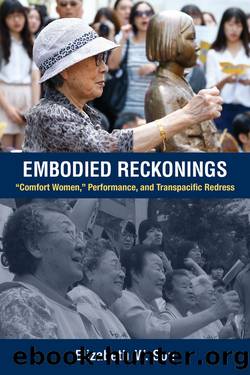Embodied Reckonings by Elizabeth Son

Author:Elizabeth Son [Son, Elizabeth]
Language: eng
Format: epub
Publisher: University of Michigan Press
The Call to Remember: Bongseonhwa (2013â2014)
Based on the 1982 novel Emi Ireumeun Josenppiyeotda [Motherâs Name was Chosun P] by original author and playwright Yoon Jung-mo, Bongseonhwa [Garden Balsam] combines choreographed movements with video projections and voice recordings of survivorsâ testimony.115 Unlike the novel, which focuses on the relationship between a survivor and her son, the theatrical adaptation explores how three generations of a Korean family struggle to come to terms with the legacies of a colonial past in which everyone is implicated in perpetuating pain and silence. âBack in 1982 it was right, age-wise, to deal with only two generations,â explained Yoon, but by 2013, when the play was written, âthe time called for a third generation.â116
The Seoul Metropolitan Theater Companyâs production of Bongseonhwa, directed by Koo Tae-Hwan, premiered at the Sejong Center for the Performing Arts on November 15, 2013. It had domestic runs at major theaters and community centers throughout 2014 and toured to the United States in the summer of that year. Bongseonhwa attempts to make the âcomfort womenâ history relevant to contemporary audiences and raises further questions about the promises and limitations of theater as a venue for âcomfort womenâ stories and the pressure to demonstrate facticity onstage when performing âcomfort womenâ histories. Though Bongseonhwa has some predictable plotlines, it differs from other theatrical productions about the âcomfort womenâ in that it directly critiques Korean society for its apathy and silence about the âcomfort women.â Bongseonhwa points out the complicity of Koreans in the violence against âcomfort womenâ and the responsibility of Koreans and others to work toward justice for survivors. It also links the violence done to âcomfort womenâ to the structural problem of domestic violence, making the seemingly distant history of sexual slavery under the Japanese military more relevant to contemporary audiences. Bongseonhwa addresses what is often unspoken during activist public eventsâthe efforts of survivors and their kin to reckon with what happened.
Bongseonhwa centers on the relationship between elderly survivor Kim Soonee; her son, Munha; and her granddaughter, Suna. The play moves between scenes of the present, where Munha has a successful career as a dean at a university, and scenes from his childhood and his motherâs time in âcomfort stations.â When Suna, who is studying for a masterâs degree at her fatherâs university and is unaware of his and his motherâs history, decides to write her thesis on âcomfort women,â the family disapproves. Sunaâs interest prompts Munha to reflect on his past. Soonee was kidnapped as a teenager and taken as a military sex slave to the Philippines, where she saved the life of Kwangsu, a young Korean man drafted into the Japanese military. When they returned to South Korea, Kwangsu and Soonee married and had a son, Munha. Kwangsu became a drunkard and verbally and physically abused his wife for having been a âcomfort woman.â After Kwangsuâs death, Soonee disappeared from her sonâs life and broke off communication with him, fearing that her past would interfere with Munhaâs success in life. He married and built an academic career.
Download
This site does not store any files on its server. We only index and link to content provided by other sites. Please contact the content providers to delete copyright contents if any and email us, we'll remove relevant links or contents immediately.
Kathy Andrews Collection by Kathy Andrews(11793)
The remains of the day by Kazuo Ishiguro(8944)
Spare by Prince Harry The Duke of Sussex(5164)
Paper Towns by Green John(5162)
The Body: A Guide for Occupants by Bill Bryson(5064)
Industrial Automation from Scratch: A hands-on guide to using sensors, actuators, PLCs, HMIs, and SCADA to automate industrial processes by Olushola Akande(5038)
Machine Learning at Scale with H2O by Gregory Keys | David Whiting(4279)
Be in a Treehouse by Pete Nelson(4016)
Never by Ken Follett(3915)
Harry Potter and the Goblet Of Fire by J.K. Rowling(3834)
Goodbye Paradise(3790)
The Remains of the Day by Kazuo Ishiguro(3376)
Into Thin Air by Jon Krakauer(3368)
Fairy Tale by Stephen King(3348)
The Cellar by Natasha Preston(3315)
The Genius of Japanese Carpentry by Azby Brown(3277)
120 Days of Sodom by Marquis de Sade(3244)
Drawing Shortcuts: Developing Quick Drawing Skills Using Today's Technology by Leggitt Jim(3057)
Reminders of Him: A Novel by Colleen Hoover(3057)
